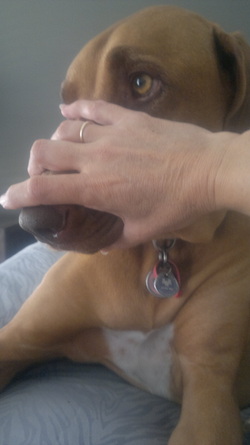
This “them and us” mentality is detrimental and it’s usually the dog who suffers more as a result. Just ask Zuri. Before I researched the notion of dominance in more depth, I carried out a simple test which was recommended to determine if Zuri was dominant. It was also the way to eliminate dominance in my dog if she proved to be so inclined.
Before I go any further, don’t try this at home folks! It may create a dog who is scared of you and apprehensive of your approach. The powerful methods I subsequently applied, based on behavioural science, enabled me to teach Zuri to enjoy this type of handling. It reversed the damage done and has nothing to do with dominance.
I was to wrap both my hands firmly around Zuri’s muzzle, essentially keeping her mouth closed and controlling movement of her head. If she struggled to remove my hands from her muzzle, she was dominant. The degree of dominance she possessed would directly correlate with the amount she struggled to get free and the length of time she tried. To assert my dominance over her, I was to maintain this firm hold no matter what, until she no longer struggled to escape.
I cringe as I write this. Zuri passed this “dominance” test and would probably rank Alpha bitch to the nth degree. She tried to break free immediately, shook her head, tried to toss my hands off, pawed at my hands, started to vocalize and was about to roll her body on the ground to seek release. To describe it subjectively, she appeared to be panicking and it was not enjoyable to witness.
My dog was scared.
I was touching Zuri in a restrictive way she had never been touched before. She was desperately trying to escape – she was not exhibiting dominance. I released my hands very quickly and she ran away. She was wary of my hands moving towards her muzzle now. I felt sick to my stomach.
This is an example of how insidious the “dominance” label can be. My gentle dog would be labelled dominant on the basis of this test. The way to fix her dominance would actually create more fear and essentially undermine a relationship based on trust.
I now set to work fixing the fear resulting from this one event. I used a totally different approach and got Zuri to enjoy her muzzle being touched. Now I can wrap my hands around her nose, making it a game. I’ve taught her to let me hold her muzzle for longer and longer. She no longer flinches or avoids my hands coming towards her nose. You can watch the video footage below or use this link if you are an email subscriber: http://www.youtube.com/watch?v=QIEB1LqwjiE
“You keep using that word. I do not think it means what you think it means!”
I couldn’t agree more, Inigo.
Interested in learning more about dominance and dogs? Here’s some reliable links.
http://www.ava.com.au/public/about-pets/polite-pets-month/resources/debunking-dominance-dogs
http://kb.rspca.org.au/What-is-the-RSPCAs-view-on-dominance-dog-training_475.html
http://drsophiayin.com/philosophy/dominance?/dominance.php
http://avsabonline.org/uploads/position_statements/dominance_statement.pdf
http://www.associationofanimalbehaviorprofessionals.com/whats_wrong_with_dominance.html
http://drsophiayin.com/blog/entry/new_study_finds_popular_alpha_dog_training_techniques_can_cause_more_harm_t

 RSS Feed
RSS Feed